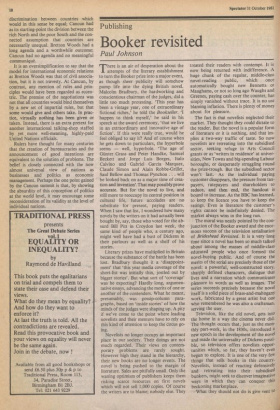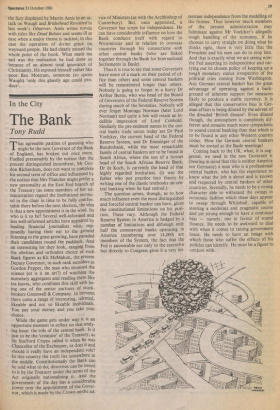Publishing
Booker revisited
Paul Johnson
There is an air of desperation about the attempts of the literary establishment to turn the Booker prize into a major event, as though sheer publicity will somehow pump life into the dying British novel. Malcolm Bradbury, the hardworking and conscientious chairman of the judges, did a little too much protesting. 'This year has been a vintage year, one of extraordinary fictional riches,' he told the Bookseller. 'I happen to think myself,' he said in his speech at the award ceremony, 'that we live in an extraordinary and innovative age of fiction'. If this were really true, would he feel obliged to say it? And of course when he gets down to particulars, the hyperbole seems — well, hyperbole. 'The age of Gunter Grass and Peter Handke, Samuel Beckett and Jorge Luis Borges, Halo Calvino and Gabriel Garcia Marquez, Claude Simon and Alain Robbe-Grillet, Saul Bellow and Thomas Pynchon . . . will be looked back on as a major time of creation and invention'. That may possibly prove accurate. But for the novel to live, and still more to reoccupy its central position in cultural life, future accolades are no substitute for present, paying readers. When I saw that list, I wondered how many novels by the writers on it had actually been bought by, say, those who voted for the absurd Bill Pitt in Croydon last week, the same kind of people who, a century ago, might well have had a bust of Dickens in their parlours as well as a shelf of his stories.
Literary prizes have multiplied in Britain because the substance of the battle has been lost. Bradbury thought it a 'disappointment' that 'this year media coverage of the short-list was initially thin, jostled out by bigger stories'. But what sort of 'coverage' was he expecting? Hardly long, argumentative essays, advancing the merits of one or another of the contenders. What he meant, presumably, was gossip-column paragraphs, based on 'inside stories' of how the minds of the judges were shaping up. A pity if we've come to the point where leading novelists and their mentors have to rely on this kind of attention to keep the circus going.
Novelists no longer occupy an important place in our society. Their doings are not much regarded. Their views on contemporary problems are rarely sought. However high they stand in the hierarchy, their new books are no longer events. The novel is being pushed to the margin of literature. Sales are pitifully small. Only the waning optimism of publishers keeps them risking scarce resources on first novels which will not sell 1,000 copies. Of course the writers are to blame; nobody else. They treated their readers with contempt. It is now being returned with indifference. A huge chunk of the regular, middle-class novel-reading public, which once automatically bought new Bennetts or Maughams, or not so long ago Waughs and Greenes, paying cash over the counter, has simply vanished without trace. It is no use blaming inflation. There is plenty of money about for pleasure.
The fact is that novelists neglected their market. They thought they could dictate to the reader. But the novel is a popular form of literature or it is nothing, and that implies a two-way traffic of taste. So now novelists are retreating into the subsidised sector, seeking refuge in Arts Council grants or as 'writers in residence' at universities, New Towns and big-spending Labour boroughs, or desperately struggling round the prize-trough. But the subsidised sector won't last. As the individual paying customer disappears, the pressure from taxpayers, ratepayers and shareholders to reduce, and then end, the handout is bound to increase. As the BBC has learned, to keep the licence you have to keep the ratings. Even in literature the customer's rights cannot be indefinitely denied. The market always wins in the long run.
The moral was neatly pointed by the conjunction of the Booker award and the enormous success of the television serialisation of Brideshead Revisited. It is a very long time since a novel has been so much talked about among the masses of middle-class educated people who once formed the novel-buying public. And of course the merits of the serial are precisely those of the novel: a powerful, well-constructed story, sharply defined characters, dialogue that lives and a narration which communicates pleasure in words as well as images. The series succeeds precisely because the novel itself is a solid piece of brass-and-mahogany work, fabricated by a great artist but one who remembered he was also a craftsman, serving the user.
Television, like the old novel, gets into the home in a way the cinema never did. The thought occurs that, just as the monthly part-work, in the 1830s, introduced a new epoch in the development of the novel and made the universality of Dickens possible, so television offers novelists opportunities which, so far, they haven't even begun to explore. It is one of the very few things that sells books in this country. Novelists, instead of reacting defensively and retreating into their subsidised bunkers, might seek to discover imaginative ways in which they can conquer this beckoning marketplace.
What they should not do is give vent to the fury displayed by Martin Amis in an attack on Waugh and Brideshead Revisited in last week's Observer. Amis writes novels with titles like Dead Babies and seems ill at ease when a major theme is tackled, in this case the operation of divine grace on wayward people. He had clearly missed the whole point of the book. What made me sad was the realisation he had done so because of an almost total ignorance of Christianity. He exposed himself rather like poor Rex Mottram, someone (to quote Waugh) 'only this ghastly age could produce'.







































 Previous page
Previous page